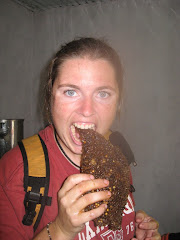Well, I've been in Africa for two months now. I like it here; things are different than what I was used to in the States, but I still like it. Right now I am still in the training portion of my service. There are 23 other agricultural-forestry (agfo) trainees; our group is really great.
For the last month and a half, I have been living with a host family. There were two other trainees in my village. The village is about 150km up country (away from the coast) and there are 36 compounds. A compound can hanve anywhere from 5 to 45 people in it, sometimes even more. Luckily mine only had six, including myself. Another trainee in my village (who happens to be a fellow Aggie - WHOOP! what are the odds?!?) had 23 people in her compound. The people of the village were very kind to us. And very patient when we experimented with language. They never ceased to laugh at us and our mistakes, which are typically quite comical. Language has been difficult, but the lightbulb has finally come on. As my Learning Coach said, "learning a language is like putting together a puzzle. it gets easier the more pieces you put down." I am learning Mandinka right now, but will soon start on a second language of Pullar (spoken by the Fula people). I am excited about the prospects of being at least conversational in both. I've decided the submersion technique of language learning is deffinately effective, I have to speak the local language in order to communicate. If i don't, then I just stay quiet all the time, and well, that just doesn't work for me :-)
We have also been learning aobut our job as an agfo volunteer. Basically we are trying to incorporate reforestation into farming practices. As many West African Nations, the Gambia is on it's way to becoming a desert. But (in theory) if we can educate and encourage others to be environmentally conscious, we can keep the gambia from the fate of places like Mauritania (which is now mostly sand dunes). Let's just say we have out work cut out for us.I specifically will be working with a regional livestock director at a live stock camp.
One big project that I will be taking over from previous volunteers at my site is a meat rabbit project. I will also be helping try to increase dairy production during the "hungry season" (before the rains come, until harvest time, people don't have enough to eat or money to buy food, so every one is hungry). This project promises to be a challenge, if people don't have money for their own food, they most likely cannot suppliment livestock diets. I am also planning on getting a donkey to give demonstrations on proper care and treatment of horses and donkeys. I will also be working with the women's poultry assosiation.
We will not be going back to training villages, but will be staying in the Kombo (close to the shore, the Banjul metroplex if you will) and going on field trips until after swearing in as official volunteers two weeks from now. Then we will go to our sites and stay there for two years.Yesterday we had Thanksgiving dinner at the US Ambassidor's house. It was nice by American standards, but completely overwhelming coming from training village where I don't have running water or electricty.
To express all I've seen and learned thus far in my short time in the Gambia would take a hundred pages, but i will try to limit my thoughts here.
-running water is nice, but over rated. electricity, however, is not-bathing under teh stars on a clear night wre electricity does not exist is a spiritual experience.
-knowledge and education are worth more than silver and gold
-ignorance really is bliss. the less you know, the less you want.
-a cold soda is worth the 5km bike ride
-child labor is actually pretty efficient (even a three year old can swing a machettie)
-i sometimes feel like a celebrity being chased by the poporatsie when little kids chase my down the street yelling tubaab (pronounced two-bob)
and that's all i got for now. love you all and miss you much.
Friday, November 30, 2007
Subscribe to:
Post Comments (Atom)

No comments:
Post a Comment